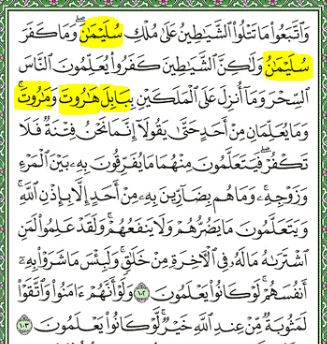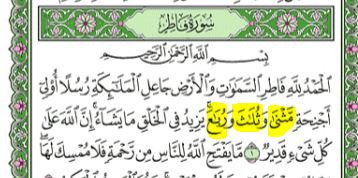السلام عليكم و رحمة الله
So, you’ve finally started understanding how nouns usually show their status:
- In the state of raf’, you see a dhammah at the end (مُسْلِمٌ)
- In nasb you see a fathah at the end (مُسْلِمًا)
- In jarr you see a kasrah at the end (مُسْلِمٍ)
Then you encounter something that just doesn’t compute. A word that you know for sure is in jarr, and looks like it should have a kasrah at the end, but somehow you see a fathah at the end!
For example, you might read, سافَرْتُ مِنْ مَكَّةَ إلى المَدِيْنَةِ (“I traveled from Makkah to Madinah”). You see a kasrah at the end of المدينةِ, and that makes sense to you because the إلى before it is one of the particles of jarr.
Then you see the word مِنْ before مَكَّة, and you know مِنْ is another one of these special particles, so مكة should obviously have a kasrah at the end. But it has a fathah on it. It must be a misprint, right?
WRONG
What happened here is that you’re looking at a word that is “partly flexible”. That means that its ending can change somewhat (like from a dhammah to fathah), but it’s not flexible enough to go all the way down to a kasrah.
Why is that?
It’s not an easy concept to grasp, and it’s not so easy to explain, but let’s can try. The scholars of the Arab language have identified some “defects”, that make an اسم resemble a فِعْل (fi’l). Just like how a fi’l will never take a tanwin, a partly flexible noun won’t either. These defects work in two different ways:
- Two “mini-defects” coming together, one going back to the meaning of the word, and one to the pronunciation (i.e. how it sounds)
- A “super defect” that has effect of two mini-defects.
About mini-defects
If a word is partly flexible because of two mini-defects, then one is connected to the meaning and one is connected to the pronunciation.
The one that goes back to the meaning will be one of these:
- It is a proper noun (عَلَمِيَّة)
- It is a descriptive noun (الوَصْفِيّة)
Then we have 6 mini-defects that are related to the pronunciation, along with how they combine with the two above. The first three will only happen for proper nouns.
- A proper noun that has been feminized without using an ا – Note: Even boys’ names with a feminine ة at the end are considered feminized, such as ُحَمْزَة and أُسامَةُ. Girls’ name fall under this rule, even if they don’t have the feminine ة.
- It’s a non-Arab name. Excepted from this rule are 3-letter names that have a sukoon on the middle letter
- The word is a proper noun formed of multiple words put together
- ُقاضِيْخان is formed from قاضي and خان
- The letters ان have been added to the end
- Any proper noun that has ان
- A descriptive noun that rhymes with فَعْلانُ
- The word sounds like a fi’l
- Proper nouns that sound like a fi’l
- Descriptive nouns that sound like أفْعَلُ. They come with comparative meanings (e.g. “___er than”).
- The word has been adjusted from its original form
- Any proper noun that rhymes with فُعَلُ
- A descriptive noun describing things that arranged in 2’s, 3’s etc. They commonly sound like فُعالُ and مَفْعَلُ.
That gives 9 combinations (6 for proper nouns and 3 for descriptive nouns). Let’s take a look at some examples for each combination:
| Proper noun | Descriptive noun | |
| Feminized without using ا | فاطِمَةُ (Fatimah), زَيْنَبُ (Zaynab), حَمْزَةُ (Hamzah) | N/A |
| Non-Arab | إدْرِيْسُ (Idrees), يَعْقُوْبُ (Ya’qub), إبراهِيْمُ (Ibrahim) | N/A |
| Multiple words | بَعْلَبَكُّ (Baalbek), فاضِيْخانُ (Qazi Khan), بزُرْجَمِهْرُ (Burzmihr), رامَهُرْمُزُ (Ramahormuz) | N/A |
| Adding ان | مَرْوانُ (Marwan), عُثْمانُ (Uthman), غَطَفانُ (Ghatafan), عَفّانُ (Affan), سُفْيانُ (Sufyan), عِمرانُ (Imran), قَحْطانُ (Qahtan), عَدْنانُ (Adnan) | رَيَانُ (lush), شَبْعانُ (satiated), يَقْظانُ (awake) |
| Sounds like a fi’l | أحْمَدُ (Ahmad), يَشْكُرُ (Yashkur), يَزِيْدُ (Yazid), تَغْلِبُ (Taghlib), تَدْمُرُ (Tadmur) | أكْرَمُ (nobler), أفْضَلُ (better), أجْمَلُ (more beautiful) |
| Adjusted from original form | عُمَرُ (Umar), زُفَرُ (Zufar), قُثَمُ (Qutham), هُبَلُ (Hubal), مُضَرُ (Mudhar) | مَثْنَى (twos), ثُلاثُ (threes), رُباعُ (fours), أُخَرُ (others) |
Super defects
There are two super-defects that are big enough to make a word partly flexible by themselves:
- The word is in the form of an utmost or extreme plural (صِيغة المُنْتَهى الجَمُوْع) – This is a broken plural that was formed using an ا, and after the ا there are two letters or three letters (with a sukoon on the middle one). Some examples:
- مَساجِدُ – plural of مَسْجِدٌ (“mosque”)
- مَنابِرُ – plural of مِنْبَرٌ (“pulpit”)
- أماجِدُ – plural of أمْجَدُ (“more majestic”)
- أماثِلُ – plural of أمْثَلُ (“more exemplary”)
- عَصافِيرُ – plural of عُصْفُوْرٌ (“sparrow’)
- The word is made feminine using ى (alif maqsurah) or by adding an ا (alif mamdudah)
- Some examples using alif maqsurah: حُبْلى (“pregnant”), قُصْوى (“farthest”), دُنْيا (“lower”), دَعْوى (“claim/allegation”)
- Some examples with an added alif: حَمْراُ (“red”), دَعْجاءُ (“black-eyed”), حَسْناءُ (“a beauty”), بَيْضاءُ (“white”), كَحْلاءُ (“black-eyed”), نافِقاءُ (“lizard hole”), عُلَماءُ (“scholars”)
From the Quran
Below, I’ve highlighted some partly flexible words from 2:102.

- The name سُلَيْمانُ is partly flexible because it is a non-Arab name. The names of the prophets عليهم السلام in the Quran are non-Arab, except four: هُوْدٌ (Hud), صالِحٌ (Salih), شُعَيْبٌ (Shu’ayb) and مُحَمَّدٌ (Muhammad). Two non-Arab names, نُوْحٌ and لُوْطٌ, are still fully flexible because of the three-letter rule
- The name بابِل (Babel) is partly flexible because it’s a proper name and is feminine. The general rule is that name of places are considered feminine
- هارُوْتُ (Harut) and مارُوْتُ (Marut) are the names of two of the angels and are non-Arab names
Below is the beginning of Surah Fatir (35:1). The highlighted words are partly flexible because they are descriptive and have been adjusted from their original form.

Exercise
Try to find the reason why these words are partly flexible. Most of them are done already, so just look above for them.
- زَيْنَبُ (Zaynab)
- مُضَرُ (Mudhar)
- يُوْسُفُ (Yusuf)
- إبراهِيْمُ (Ibrahim)
- أكْرَمُ مِنْ أحْمَدَ (“nobler than Ahmad”)
- بَعْلَبَكُّ (Baalbek)
- رَيّانُ (“lush”)
- مَغالِيْقُ (“locks”)
- حَسّانُ (Hassaan)
- عاشُوْراءُ (Ashura)
- دُنْيا (“lower/nearer”)
Questions
- What does it mean when a noun is “partly flexible”?
- What are the “mini-defects” that go back to the meaning of the word?
- What are the (6) “mini-defects” that go back to the word’s pronunciation?
- How many combine with the meaning of a proper noun?
- How many combine with a descriptive meaning?
- What are the two “super-defects” that cause partial flexibility?
- Give an example of a word that is partly flexible because it is:
- A proper name that has been adjusted from its original form
- A descriptive noun that has been adjusted from its original form
- A proper name that has ان added to the end
- A descriptive noun that has ان added to the end
- A proper name that has been feminized
- A descriptive noun that sounds like a fi’l
- A non-Arab proper name
Until next time, السلام عليكم و رحمة الله و بركاته
Like this post? Simply enter your e-mail and click “Yes, include me!” for updates
Leave a Reply